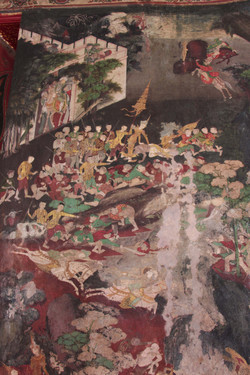Artwork Search
Arts in Southeast Asia Database
The painting of Mahosot Jataka
Keywords :
| Site common name | Wat Suwannaram |
|---|---|
| Site alternative name | Wat Suwannaram, Bangkok Noi, Wat Thong |
| Type of artwork | Painting |
| Sub district | Siri Rat |
| District | Khet Bangkok Noi |
| Province | Bangkok |
| Region | Central |
| Country | Thailand |
| Geographic Coordinates Decimal degree | Lat : 13.763302 Long : 100.476838 |
| Geographic Coordinates UTM | Zone : 47 P Hemisphere : N E : 659661 N : 1522037.25 |
| Place of artwork | The wall of Ubosot |
| History of production | Wat Suwannaram, Bangkok Noi or Wat Thong is the ancient temple exists since Ayutthaya period. During the reign of King Phutthayotfa Chulalok, Rama I of Bangkok has ordered the renovation of the temple and gave the name Suwannaram. It is assumed that the Ubosot was built during this time and was likely featured the wall painting of Ajarn Nak, the famous royal artist of that time. However, during the reign of King Nangklao, the grandson of Ram I, the King has ordered another renovation which included the replacement wall painting due the temple’s poor condition. |
|---|---|
| Art | The stories featured in the wall painting are traditional tales such as the life of Lord Buddha, The Gathering of Devas Jataka, and Buddhist Cosmology. However, there is evidence of Western influences in the form of realistic style of painting in each scene in the buildings and the livelihood of people. The painting also reflected the traditional technique of depiction of the royalties through the Ramayana’s like style of humans, both for male and female characters with the glid on top of them. The darker color background also drives the pictures of the Palace, households and humans to stand out in the dimensional way. |
| Key academic information | The wall paintings of Ubosot of Wat Suwannaram, Bangkok Noi District depict the stories of the life of Lord Buddha, The Gathering of Devas Jataka, Tossachata Jataka and Buddhist Cosmology. It is the reflection of the masterpiece craftwork of the reign of King Nangklao. The painting in one hall was estimate by Prince Narisara Nuwattiwong to be the work of Master Kong Pae who was the famous artist of the time. The painting depicts the War of 101 Armies of Mahosot Jataka that tells the story of Mahosot Bodhisattva commanded the army of Mitila City and tricked the Gevata Purohita, the commander of 101 Armies to pick up the fallen jewelry that he intentionally dropped. When the Purohita fall to the plan, he then wrestled him down and had his soldiers making noise to lure the 101 Armies that their commander was slain and led to the dispersal of the armies. The painter had depicted the emotions of each characters of the story distinctively as well as the detailed depiction of the dispersal of Gevata’s army. |
| Period | Historical Period |
| Art period | Rattanakosin |
| Age | 24th Buddhist Century |
| Sect | Theravada |
| Religion and belief | Theravada Buddhism |
| Type of License | Attribution-NonCommercial-NoDerivs (CC BY-NC-ND) |
|---|---|
| Rights | Princess Maha Chakri Sirindhorn Anthropology Centre |
| Date of record creation | 2016-09-15 |
| Record creator | Patsaweesiri Premkulanan |
| Bibliography | ประยูร อุลุชาฎะ. วัดสุวรรณาราม. กรุงเทพฯ: เมืองโบราณ, 2540. สันติ เล็กสุขุม. จิตรกรรมไทยสมัยรัชกาลที่ 3 : ความคิดเปลี่ยนการแสดงออกก็เปลี่ยนตาม. กรุงเทพฯ: เมืองโบราณ, 2548. |


